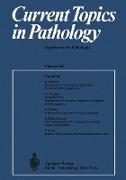Current Topics in Pathology / Ergebnisse der Pathologie
BücherAngebote / Angebote:
Toxoplasmosis is a ubiquitous infection, contracted by at least a third of the population in most areas of the globe. Clinical disease arises rarely, usually unexpectedly, but sometimes with disastrous effects on the patient. Humans, pets, farm and zoo animals may contract toxoplasmosis, possibly involving any clinical laboratory in its diagnosis. Pathologists must ponder the clinical significance of a hyperplastic l. ymph node, a cyst found at autopsy, or a serologic titer. Serving as scientific physicians, pathologists are asked: How is toxoplasmosis diagnosed? 'What is the treatment for ocular toxoplasmosis, for congenital infection, or for toxoplasmosis in the immunologically compromised host? vVhy does disease develop in as diverse areas as the eye, lymph nodes and placenta? How is Toxoplasma transmitted? This review proposes to survey recent advances, providing a scientific background to diagnose and manage the clinical problems of toxoplasmosis. Reviews are available which emphasize other aspects, such as serologic pro cedures, resistance and immunity (REMINGTON, 1970), the clinical syndromes (DESMONTS, '1969, FELDMAN, 1968) and comprehensive presentations (JACOBS, 1967, FRENI{EL, '1970). Transmission and Prevalence The recent discovery of the coccidian stages of Toxoplasma in the cat intestine and the Toxoplasma oocyst excreted in cat feces, considerably broadens our understanding of Toxoplasma and its transmission (FRENKEL, DUBEY and MILLER, 1970).
Folgt in ca. 5 Arbeitstagen




